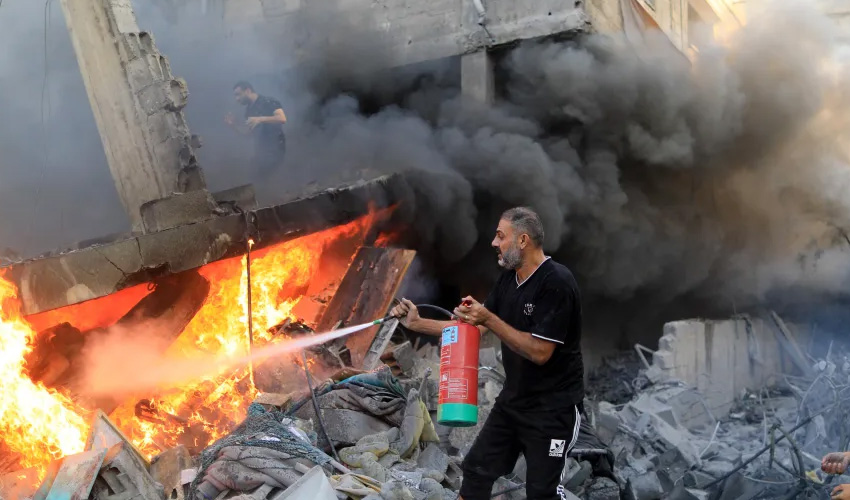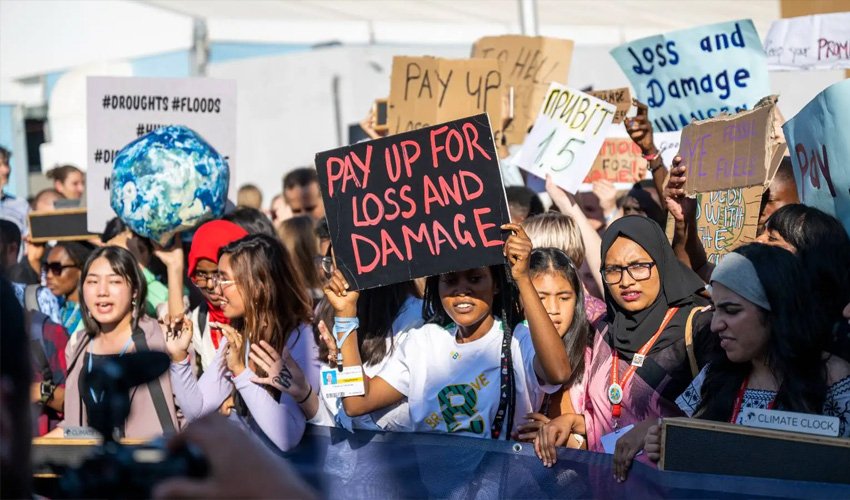Israeli Defence Forces (IDF) announced that 24 of its soldiers were killed in battle with Hamas in a fierce battle in Southern Gaza amid reports that Israel’s spy chief proposed Hamas leaders leave Gaza as part of broader ceasefire talks as Israeli PM Netanyahu has been under immense pressure from domestic to stop the war for early hostages release along with the U.S. insisting on the two-state solution in the wake of imminent post-war day.
CNN reported that Israel has proposed that Hamas senior leaders could leave Gaza as part of a broader ceasefire agreement, two officials familiar with the ongoing international discussions told CNN.
The extraordinary proposal, which has not been previously reported, comes as Israel has struggled to achieve its stated goal of completely destroying Hamas. Despite its nearly four-month war in Gaza, Israel has failed to capture or kill any of Hamas’s most senior leaders in Gaza and left around 70% of Hamas’ fighting force intact, according to Israel’s own estimates.
The Israeli army says 21 of its soldiers have been killed in Gaza - the deadliest day for Israeli forces since the start of their ground operation.
A spokesman for the Israel Defense Forces (IDF), Daniel Hagari, said it is thought a rocket-propelled grenade hit a tank near two buildings they were in.
He said the buildings exploded probably as result of mines that Israeli forces had placed there to demolish them.
The IDF says it is still investigating the details of the incident.
Israel has been seeking to eliminate Hamas since gunmen killed more than 1,300 people in the 7 October attacks.
Combat raged in Khan Yunis in the southern Gaza Strip on Tuesday, against a backdrop of negotiations aimed at bringing about a pause in fighting between Israel and Hamas in the absence of a long-term peace plan.
The Palestine Red Crescent Society said early Tuesday that Israeli forces had targeted its headquarters in Khan Yunis "with artillery shelling on the fourth floor, coinciding with intense gunfire from Israeli drones, resulting in injuries among internally displaced individuals who sought safety on our premises".
The UN humanitarian agency OCHA reported that "ground operations, fighting and attacks intensified" over the preceding day around the main southern city, with the Israeli army saying its forces had conducted multiple raids and taken control of Hamas command centres there.
The fierce fighting came as a White House official was due in the region for talks aimed at securing more hostage releases, and as US media reported a new Israeli proposal for a deal that would involve a two-month pause in fighting.
UN agencies and aid groups have sounded the alarm about the growing threat of disease and famine in Gaza, where 1.7 million people are estimated to have been displaced from their homes.
Abu Iyad, his belongings piled on a donkey-drawn cart, told AFP on Monday that he was moving for the seventh time, fleeing Khan Yunis for Rafah on the Egyptian border, where hundreds of thousands of displaced Palestinians have settled, many in makeshift tents.
"I'm heading to the unknown," he said. "They told us to go to Rafah -- where to go in Rafah? Is there any space left?"
- Hostage talks -
The war in the Palestinian territory broke out with Hamas's unprecedented October 7 attacks, which resulted in the deaths of about 1,140 people in Israel, mostly civilians, according to an AFP tally based on official Israeli figures.
In response, Israel has carried out a relentless offensive that has killed at least 25,295 people in Gaza, around 70 percent of them women, children and adolescents, according to Gaza's health ministry.
The Hamas attack also saw about 250 hostages seized, and Israel says around 132 remain in Gaza. That number includes the bodies of at least 28 dead hostages, according to an AFP tally based on Israeli data.
Relatives of the captives stormed a parliamentary committee meeting on Monday demanding urgent action.
"You sit here while our children are dying over there," yelled Gilad Korngold, father of hostage Tal Shoham, an AFP correspondent reported.
US news outlet Axios reported on Monday night that Israel had proposed to Hamas, via Qatari and Egyptian mediators, a new deal to free all the hostages.
The report, citing unnamed Israeli officials, said the proposed deal would be carried out in multiple stages, and would also involve the release of an undetermined number of Palestinian prisoners.
The plan was expected to take about two months to complete.
The proposal does not include promises to end the war, but it would involve Israeli troops reducing their presence in major cities in Gaza and gradually allowing residents to return to the territory's devastated north, the Axios report said.
News of the proposal comes as US media said the White House's coordinator for the Middle East, Brett McGurk, was expected in Egypt and Qatar for meetings aimed at securing a new hostage exchange deal.
State Department spokesman Vedant Patel, however, said that Washington still believed "a two-state solution, a creation of a Palestinian state, is the only path that gets us out of this endless cycle of violence".
- Two-state solution -
Netanyahu has steadfastly rejected calls for the creation of a Palestinian state, saying Israel must maintain "security control over all the territory west of the Jordan" River, an area that includes all of the Palestinian territories.
EU foreign ministers on Monday pressed Israel to change its mind at meetings in Brussels with the top diplomats from the two warring parties and key Arab states.
"The two-state solution is the only solution, and even those who don't want to know about it have not yet come up with any other alternative," said German foreign minister Annalena Baerbock.
EU foreign policy chief Josep Borrell said that more death and destruction in Gaza "will not help to defeat Hamas or the ideology", nor would it make Israel safer.
At the gathering, Israeli foreign minister Israel Katz ignored questions from journalists over a future two-state solution and said his country was focused on returning the hostages and ensuring its security.
Jordanian Foreign Minister Ayman Safadi, who was also in attendance, said Israel's rejection of "the two-state solution is dooming the future of the region to more conflicts".
- Yemen strikes -
The war in Gaza has spurred fears of a wider escalation, with a surge in violence involving Iran-backed Hamas allies across the region.
Yemen's Huthi rebels announced on Tuesday that they had fired missiles at a US military ship in the Gulf of Aden near the Red Sea, but a US defence official said no attack had taken place.
The United States and Britain later announced a fresh round of strikes on Huthi targets in response to the rebels' continued attacks on Red Sea shipping.
The US Central Command said in a statement that the targets of the strikes "included missile systems and launchers, air defense systems, radars, and deeply buried weapons storage facilities".



























